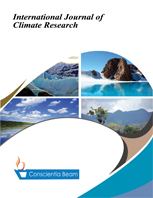Impact of hospital wastewater on the rivers’ quality: Case of Byumba hospital
DOI:
https://doi.org/10.18488/112.v7i1.3355Abstract
Hospital wastewater may pose chemical, biological, and physical threats to public and environmental health. This study's objective was to evaluate the effects of hospital wastewater on waterways' quality through physico-chemical parameters’ analysis where samples were collected on-site between July and November 2021, and then using EPA and Hash procedures, they were preserved, prepared, and measured in the Environmental Research Laboratory at the University of Lay Adventists of Kigali (UNILAK-ERL). According to the findings, both receiving streams were contaminated to the following degrees: pH (88.51%), TDS (55.98%), COND (55.92%), TP (10.14%), TN (39.70%), COD (25%), Cr (9.90%), Zn (20%), Mn (4.28%) for Ruhashya stream and pH (48.43%), TDS (26.75%), COND (26.73%), TP (20.83%), TN (13.33%), COD (5.55%), Cr (19.49%), Zn (30%), Mn (4.33%) for Rwiminsi stream respectively. The findings demonstrated that Byumba hospital effluent has the potential to contaminate the ecosystem if improperly managed. Therefore, Byumba Hospital should improve the effectiveness of its hospital and routinely examine the effluent quality originating from its wastewater treatment facility; in addition, People should not be allowed to drink water from streams that receive Byumba Hospital effluents; finally, local government officials should enforce the polluter-pays principle, and environmental regulatory agencies should stiffen the penalties for institutions that fail to manage their wastes properly. Others studies on waste have been conducted, but there hasn't been any research on total dissolved solid particles (TDS), mercury (Hg), lead (Pb), and other heavy metals, BOD, and COD. So, this research fills the gap left behind by other researchers.

